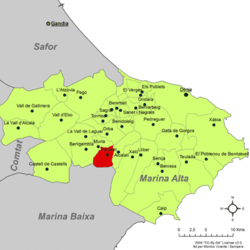Parcent
| Parcent | ||
|---|---|---|
| Village | ||
| ||
 Location in the Valencian Community, Spain | ||
 Location in the comarca Marina Alta | ||
| Coordinates: 38°44′N 00°03′E / 38.733°N 0.050°ECoordinates: 38°44′N 00°03′E / 38.733°N 0.050°E | ||
| Country | Spain | |
| Province | Alicante | |
| Comarca | Marina Alta | |
| Government | ||
| • Mayor | Máximo Revilla | |
| Area | ||
| • Total | 11.8 km2 (4.6 sq mi) | |
| Elevation | 295 m (968 ft) | |
| Population (2006) | ||
| • Total | 1,019 | |
| • Density | 86.36/km2 (223.7/sq mi) | |
| • Language | Spanish | |
| Demonym(s) |
Parcent (Spanish) Parcent (Catalan) | |
| Postcode | 03792 | |
| Market Days | Monday | |
| Website | http://www.parcent.es/ www.veinsdeparcent.info | |
| festivals = Fiestas of San Antonio Abad, which features a pilgrimage and blessing of the animals, in January; Carnival, in February; San Vicente Ferrer Festival, in April; San Lorenzo Festival, in August | ||
Parcent (Valencian: [paɾˈsent]; Spanish: [parˈθent]) is a village in the Pop Valley[1] of La Marina Alta in the Alicante Province, which is located in the Valencian region of Spain. Parcent has a population of about 1100 and is about one hour's drive north of the city of Alicante, and about an hour's drive south of the city of Valencia.
It features the small but beautiful Holy Virgin church, and is surrounded by rolling hills and mountains. Writer Gabriel Miró (1879-1930) was a resident of Parcent and called it a "paradise between the mountains".
It is also close to Jalón (written as Xaló in Catalan), which is famous for its excellent wine production and markets. The traditional economy of Parcent relies on almond and orange farming in the surrounding area.
History
The name "Parcent" is of Latin origin. Later, it was a Moorish town until the forces of James I of Aragon conquered it in 1256 CE.
There was a major outbreak of leprosy in Parcent in 1850 and by 1887 20% of the residents of Parcent were afflicted.[2] This apparently motivated the inclusion of passages about the disease in Miró's two so-called "Oleza" novels.[3]
Demographics
The 2006 census established that Parcent's population was 1,019 inhabitants. It was also revealed that about 35.10% of the population of Parcent were not Spanish citizens but were in fact incomers from other countries within the European Union.
| Historical population | ||||||||||||||||||||||||||||||||||||||||||||||||||||||||
|---|---|---|---|---|---|---|---|---|---|---|---|---|---|---|---|---|---|---|---|---|---|---|---|---|---|---|---|---|---|---|---|---|---|---|---|---|---|---|---|---|---|---|---|---|---|---|---|---|---|---|---|---|---|---|---|---|
|
|
| ||||||||||||||||||||||||||||||||||||||||||||||||||||||
Controversy
Many Europeans from other areas have built retirement or second homes in Parcent, enjoying the sunshine and proximity to the beaches. However, Parcent and the surrounding valley are suffering growing pains as development quickens.[4]

References
- ↑ It has become common to refer to the Pop Valley as the Jalón Valley in English as it is the largest town in the valley.
- ↑ On the Origin and Spread of Leprosy in Parcent, Spain, George Thin, Lancet, p. 134, January 16th, 1892.
- ↑ The Biblical Allusions in Gabriel Miro's Oleza Novels, G. G. Brown, The Modern Language Review, Vol. 70, No. 4 (Oct., 1975), pp. 786-794
- ↑ In Spain, a Tide Of Development: Land Laws on the Mediterranean Coast Enable a Boom but Bring Corruption, John Ward Anderson, Washington Post Foreign Service, Wednesday, October 25, 2006
.svg.png)